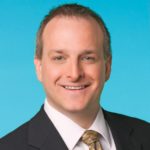
Dr John Studley, Scientific Director at Scientific Update recently spoke to Dr David Leahy, Takeda, USA ahead of his presentaion at the 2019 Catalysis in the Pharmaceutical and Fine Chemical Industry Conference in Lucerne, Switzerland. David will talk about “A Pharmaceutical Industry Perspective on Sustainable Metal Catalysis”- following on from his paper published recently in Organometallics (2019, 38 (1), 36-46).
John Studley (JS): What are the main challenges in metal catalysis? What will be the state of the art in 10 years? 100 years?
Dave Leahy (DL): I think site selectivity for C-H activation is really one of the next main challenges to overcome in metal catalysis. Jin-Quan Yu has begun to revolutionize the field but we are really just beginning to be able to think about how to make catalysts that do not rely on programmed, innate or directed reactivity for selectivity.
JS: What do you think are currently the most exciting research areas in metal catalysed chemical processes?
DL: I’m very interested in some of the great work by Paul Chirik, Neil Garg, Dan Weix and many others on non-precious metal catalysis. In addition to be able to have more sustainable versions of the transformations that we so heavily rely on, it is very exciting to see new orthogonal reactivities that these elements can provide.
JS: Do you believe that organocatalysis could ever completely replace transition metal processes?
DL: I think organocatalysis, biocatalysis, transition-metal catalysis and base-metal catalysis will all have their place. All will evolve and become more and more efficient, but it is hard to see any completely overshadowing the others.
JS: With the 2018 chemistry Nobel Prize being jointly awarded to Frances Arnold for biocatalytic engineering, how do you see this field developing over the next decade?
DL: There has been so much growth in this field, and certainly directed evolution approaches to enzyme evolution dramatically expands the potential toolbox for biocatalytic processes. During the next decade we should see new chemical reactions that are not part of nature’s toolbox being accomplished with engineered enzymes, inspired by Frances’s work in biocatalytic cyclopropanation, nitrene insertion and other non-natural transformations.
JS: A recent perspectives article by Manfred Reetz (Acc. Chem. Res. 2019, 52, 336-344) describes his efforts to tune transition metal catalysis with engineered metallo-enzymes. What are your views on this type of approach?
DL: It will be extremely interesting to see what happens to this area once machine learning approaches become more mainstream and accessible to chemists. This is already being applied to directed protein evolution.
JS: What do you think is the most efficient industrial catalytic process? If you had to re-design it what would you do differently?
DL: I love that the Haber-Bosch process, arguably one of the most important metal-catalysed processes known to man (at least if we want to eat), uses iron. That said, I’d think the entire process could be more sustainable if the needed hydrogen could come from electrolysis of water rather than steam reforming of methane. Perhaps one day in the not too distant future, ammonia will be prepared completely electrochemically.
JS: I enjoyed reading your article in Organometallics (2019, 38 (1), 36-46) and am looking forward to your presentation ‘A pharmaceutical perspective on sustainable metal catalysis’ -can you tell us a little more about what to expect?
DL: My presentation will further explore these themes but will include some even more current examples of sustainable metal-catalysis on scale practiced in the pharmaceutical industry.
JS: 2019 is the International year of the periodic table- What is your favourite metallic element and why?
DL: Rhodium – I guess I have expensive tastes. But I did my Ph.D. studying rhodium-catalyzed allylic substitutions, so I’ll always have a special affinity for this metal.
JS: Who inspired you to study chemistry?
DL: A lot of people have inspired me in chemistry over the years, but I’ll mention Paul Reider, who was the head of process chemistry at Merck for quite some time. I saw him give a lecture that really highlighted the importance of process chemistry and the innovation possible within that discipline. This lecture really shaped my interest in pursuing a career in process chemistry, as to that point I thought I wanted to do discovery chemistry.
David Leahy was talking to John Studley, Science Director at Scientific Update. For more information on Scientific Update or on the conference that David will be presenting his work, please contact John:
Dr John Studley
Scientific Update
Maycroft Place
Stone Cross
Mayfield
East Sussex
TN20 6EW
UK
T: +44 (0) 1435 873062
E: [email protected]
W: www.scientificupdate.com








